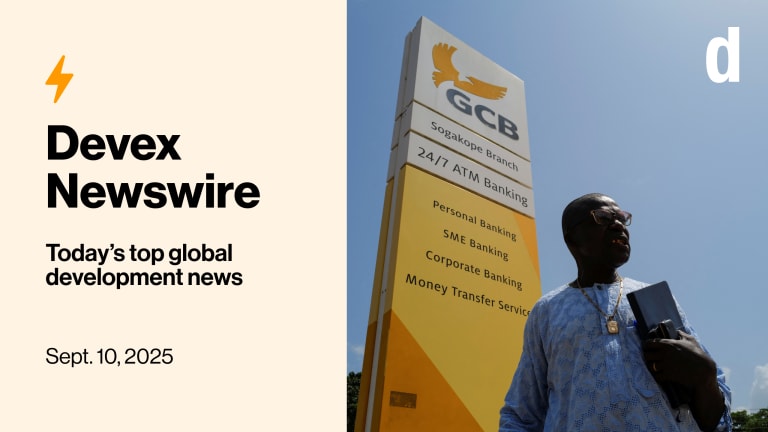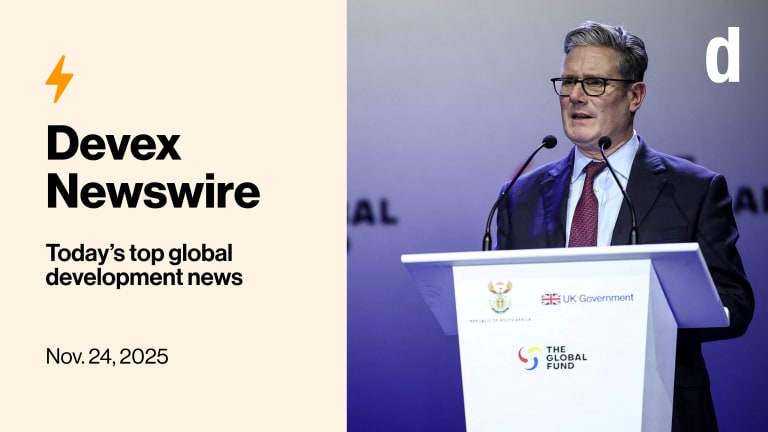Presented by International Monetary Fund

The World Bank band plays on in South Korea despite political turmoil in the streets.
Also in today’s edition: Will “Trump One” choices mean bidding business as usual at USAID? And when the law is not enough to protect transgender people.
Diary date: It’s nearly time to bid farewell to 2024 and turn our minds to 2025, which means reserving a spot next Thursday, Dec. 12, to join Devex and a panel of global development leaders to explore the trends, challenges, and opportunities that will define the year ahead.
Seoul music
This is a preview of Newswire
Sign up to this newsletter for an inside look at the biggest stories in global development, in your inbox daily.
It’s fair to assume this week’s (quickly rescinded) declaration of martial law in South Korea was not on the World Bank’s bingo card when it planned to host the final meeting for the 21st replenishment of the International Development Association in Seoul.
But the tumultuous turn did not stop country representatives gathering Thursday for the start of a two-day meeting to top up the bank’s fund for low-income countries.
“I would like to express my gratitude for you attending this meeting, despite other events,” Kim Beomseok, South Korea’s first vice minister of economy and finance, told the audience Thursday. “Our economic and political structures remain stable and we continue to operate without any disruption. I believe that the process of resolving other events is the evidence of Korean democracy's resilience. I can assure the safety of all participating delegations.”
The opening ceremony featured some fantastic violin playing by 10-year-old Yeonah Kim as well as a recap of some of this year’s early pledges.
Tellingly, the likes of Denmark (with its 40% increase compared to the last IDA replenishment in 2021), Croatia (a 115% increase), and the United Kingdom (40% increase) were all flashed on the big screen in percentage terms. All except the United States, whose pledge of $4 billion from last month appeared only as a “$500 million” increase on its 2021 pledge. What's that in percentage terms? 14%.
ICYMI: Your primer for the biggest IDA replenishment ever
Background reading: The World Bank’s IDA replenishment — the money, the odds, the high stakes
+ For more insider brief on development finance, sign up for Devex Invested, our free, Tuesday newsletter on business, finance, and the SDGs.
Rising stars
Asia’s dramatic economic transformation has pulled many of its nations out of the ranks of aid recipients and into the category of donor nations, providing a fresh focus and funds to global development efforts. Now Devex is shining a spotlight on six standouts — Japan, South Korea, Indonesia, Thailand, Kazakhstan, and Taiwan — exploring their priorities after the tables were turned.
The familiar story of recent years has been one of the traditional big aid players slashing their budgets as economic troubles bit hard. But not our chosen six, which collectively shelled out $20.8 billion in aid in 2022, our analysis shows — a 17% boost on the previous year.
Japan is the MVP by far, contributing no less than $17.5 billion of that total, with India, Bangladesh, and the Philippines among the countries benefiting from infrastructure and economic support from Japan.
There’s a clue to a trend there: These nations throwing their money around are mainly throwing it around on their own continent. Their strategies offer an intriguing insight into how economic success can change global development, write my colleagues Miguel Antonio Tamonan and Alecsondra Kieren Si.
Read: How much do Asian donors spend on development? (Pro)
+ Not yet a Devex Pro member? Start your 15-day free trial today to access all our expert analyses, insider insights, funding data, exclusive events and career resources, and the Pro Insider — a special Sunday newsletter covering our industry’s big moves for Pro members.
Second-term contracts
As many in the development world gnaw their fingernails wondering what surprises a second Donald Trump presidency might bring, what can suppliers bidding for USAID business expect from January?
The answer is change but probably no dramatic overhaul, according to Mike Shanley, the CEO of the advisory consultancy Konektid, who pointed back to evidence from the first Trump administration when he spoke at a Devex Pro event on Monday.
Shanley argued that senior positions are likely to be filled with “Trump One” people — continuity figures, rather than tear-it-all-down radicals — in the mold of the highly regarded Mark Green who ran USAID after Trump’s victory in 2016.
And even if funding policy is turned on its head after Inauguration Day, the slow-turning Washington wheels could yet frustrate wannabe revolutionaries, with the agency set to spend money allocated by the current U.S. Congress for some time yet.
“It can take a year or two before a lot of those major budget priorities come through and that could be around the time the midterms happen,” Shanley said, adding: “You might have one or both chambers of Congress flip.”
Read: Will bidding for USAID contracts be different under Trump? (Pro)
ICYMI: Return to Trumpworld — who will shape US aid policy? (Pro)
+ Devex Pro members get the most out of our coverage of the U.S. aid sector.
T time
Transgender people in Pakistan have legal protection against discrimination and harassment under legislation passed in 2018 — but that does not mean they have been embraced by a conservative society.
Violence and harassment are all too common, reports Devex Senior Reporter Sara Jerving, which means visiting health facilities risks mockery and insults, and even being shunned by staff who push transgender people to the back of the line. That’s particularly problematic for a population whose risk of infectious disease is already higher than the general public.
This is where community-based organizations such as the Dareecha Male Health Society plug gaps by providing safe spaces for infection screenings and referrals for treatment, as well as mental health services.
And in the major city of Rawalpindi, the police department has a plan to tackle the similar problem of the ridiculing of transgender people who report crimes, an initiative spreading across Punjab province.
Read: Increasing health access for Pakistan’s shunned transgender population.
+ To get in-depth insider reporting and analysis on global health, sign up to Devex CheckUp, a free, Thursday newsletter — and get today’s edition in your inbox soon.
The least get less
More controversy beneath the surface of aid spending in the United Kingdom, hard on the heels of last week’s announcement of a £300 million cut in the sums going to overseas programs in the current 2024-25 financial year.
The Bond network for U.K. aid organizations has crunched the numbers and uncovered that least developed countries, or LDCs, received their lowest share of the aid budget for more than a decade in 2023 — just 47.2%, down from 54.2% in 2020 before aid cuts began.
Bond says it means the U.K. no longer meets the OECD Development Assistance Committee target to deliver at least 0.15% of national income as aid to LDCs, because its allocation was just 0.08% last year.
Other worrying statistics include that 2023 saw the lowest level of U.K. aid spending on health in at least 10 years, at just 7.6% of bilateral aid — while education spending dropped to 3.5%, just half the 7% allocated in the second half of the last decade.
Where is the money going, even from within a smaller pot? The answer, Bond says, is to the U.K.’s development finance institutions, primarily British International Investment, which enjoyed a 53% annual budget boost last year alone.
ICYMI: UK aid on track to stay at 0.5% for rest of the decade
Warming work
As, depressingly, the world’s temperature continues to go up, so inevitably does the number of jobs connected to the climate emergency — but have you wondered which organizations are providing the most opportunities, or offering the highest salaries?
To understand this market better, Devex reviewed all qualifying positions on our job board, analyzing no fewer than 244 posts listed by 74 employers in 65 countries, paying anything from just $7,620 in one African country to a whopping $343,600 for a position with a leading international finance institution.
Read: What were the highest-paid climate jobs in 2024? (Careers)
+ A Devex Career Account membership includes all the valuable resources you need to be successful in your globaldev job hunt. Not yet a member? Get up to 75% off an annual membership when you sign up today.
In other news
The U.N. sexual and reproductive health agency has launched its $1.4 billion funding appeal for 2025 to deliver services to safeguard the rights of women and girls caught in crisis in 57 countries. [UN News]
The Swiss Parliament on Wednesday voted to cut the country’s foreign aid budget by $282 million. [Swissinfo.ch]
GivingTuesday, the first Tuesday after Thanksgiving and a key date on the U.S. charity giving calendar, raised $3.6 billion, up 16% from last year. [AP]
Sign up to Newswire for an inside look at the biggest stories in global development.








